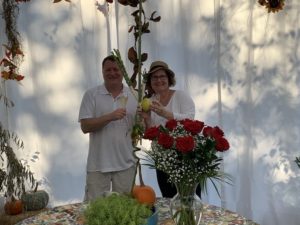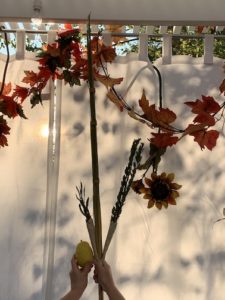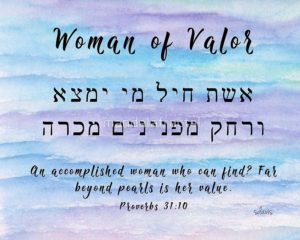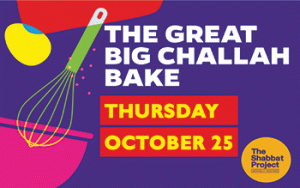Our Anniversary In The Sukkah
Twenty seven years ago, my husband and I stood under the huppa (chuppa) and made our vows to stick together through the best and worst of times and everything in between. We made a commitment to create a life together based on Jewish values under the watchful eye of God, that’s what a huppa is all about.
Today, on the last day of Sukkot, which is also Shabbat, known as Hoshana Rabbah, we are renewing our vows to each other and, by doing certain rituals under the sukkah, we are renewing our vows to God and the the Jewish people.
When I was a bride I clutched a bouquet of ivory roses as I walked down the aisle towards my soon-to-be husband who stood under the huppa waiting for me with a nervous smile on his face. Today, I hold in my hand the sweet smelling fruit called etrog (esrog) with the palm, myrtle and willow branches of the lulav, and wave the Four Species together in all directions in the sukkah. Scott’s still smiling, but this time because I’m shaking my lulav and we’re having strudel for dessert.
Lulav and Etrog Symbolize Unity
I have chosen Sukkot as the theme of this year’s anniversary–why not–considering the actual modern gift associated with the 27th year is “sculptures.” So, here’s my attempt to connect the meaning of the sanctity of marriage to this joyous holiday.
The lulav and etrog can be compared to a married couple, who bring their own unique qualities and strengths to a relationship. A lulav is a slender palm branch that is held together with two willow branches and three willow branches. An etrog, or citron, looks like an enlarged bumpy lemon and a whiff of the subtle scent is heavenly and intoxicating. Together, the branches and fruit have their own beauty and symbolism.
A midrash explains that the Four Species symbolize the importance of unity among different types of Jews. The etrog has both a flavor and a scent, like a Jew who is both learned and observant of the commandments. The lulav is from a date palm, and so it has a taste but no scent. It is likened to a Jew who is learned but does not apply that knowledge in action. A myrtle has a pleasant odor but no taste, and it represents the Jew who has little book learning behind his or her observance. Finally, the willow lacks both fragrance and taste, just like the Jew who neither studies the Torah nor keeps the commandments. These differences among Jews are substantial, yet we can still come together in solidarity, just as the lulav and etrog are bound together to merit a blessing. Same as a married couple. We bring our own unique qualities to the relationship, and we are better, stronger when we are committed as one.
Dreaming of Coronavirus and Casseroles Keep Me Up At Night
 Two main things keep me up at night. First and foremost, the health and safety of my family. Secondly, what to make for dinner. Also, hot flashes. So technically that’s three things that keep me tossing and turning in bed while everyone else is sleeping. Continue reading
Two main things keep me up at night. First and foremost, the health and safety of my family. Secondly, what to make for dinner. Also, hot flashes. So technically that’s three things that keep me tossing and turning in bed while everyone else is sleeping. Continue reading
Eishet Chayil, “Woman of Valor,†The Ultimate Mother’s Day Poem
This Mother’s Day is unusual—every day is unusual—because the covid pandemic continues to separate many of us from our loved ones. For many families, their mothers and children are apart, and social distance parties and Zoom meetings are the next best thing to actually being together physically. This Mother’s Day, I will be celebrating with my husband and our son Jack, who promised to whip up something creative for dinner, maybe a ginger cocktail, deviled egg appetizer, squash salad, and some kind of chicken drizzled with a tzatziki sauce that is all plated like a fine Mediterranean restaurant. I will be missing our younger daughter Sari who is away at pharmacy school studying for finals.
On this Mother’s Day, I am beyond grateful that I am healthy and so is my family, so truly this is the greatest gift of all.  All I ask for, besides a little adulation for holding down the fort during these last two months of quarantine, is a lilac bush planted in the backyard so I can inhale the sweet fragrance with every gentle breeze.
On every Friday night, when we welcome the Sabbath Queen, we have an opportunity to celebrate Mom every singe week–it’s called Eishet Chayil (pronounced aish-et chai-eel or eishes chayil), translated to “Woman of Valor,” and this poem written thousands of years ago by King Solomon pays homage to the matriach of the family like no other words can. Continue reading
From Mourning To Celebration, Israel Teaches Us Resilience
During these challenging times of corona, every day, every hour, is unpredictable. Sometimes fear and sadness seem to overlap with laughter and happiness, all in the same moment. Our resilience is being tested right now. Even in the darkest hour, we have faith that there will be light again. This strength is never more evident than how the Jewish people transition from Yom HaZikaron (Israel’s Memorial Day) to Yom Ha’atzmaut (Israel Independence Day), which is April 27 and 28 this year.
In the time span of a week, Israel goes from mourning the six million Jews who perished during the Holocaust (Yom HaShoah), to the next week remembering the soldiers who sacrificed their lives , Israel Memorial Day, to the very next day celebrating Israel becoming a state, Israel Independence Day,  Yom Ha’atzmaut. Typically these momentous events draw crowds of people, but during the pandemic lockdown the many ceremonies took place in empty venues and were broadcast online, allowing the world to witness how a nation comes together in solitude in the worst and best of times. This trajectory of lows and highs, our ability to adapt and to never give up, has led to the survival of the Jewish people. And this is the kind of strength that we all need to embrace during the global health crisis. Â
Havdalah Concludes Shabbat, Ignites Our Senses
Many of us are wondering what will life be like post COVID pandemic—first and foremost, will we be alive? Will we be healthy, weak, relieved, scared, safe, ecstatic to have our freedom again? Will we continue to have a greater awareness of what is most important in life, not put as much emphasis on the daily grind, the hustle, the material things that bring only temporay satisfaction? Will we be more understanding, patient, empathetic, loving, and responsible for each other? After living in a bubble for so long, will we continue to live to our full potential, our higher purpose, and will we remember what it feels like to life each other up and that we are all in this together?
When Jewish people observe Shabbat they go through a similar transition on Saturday night when the stars come out and we prepare to re-enter the week, that transition from the holy to the mundane. Our body and soul has been renewed for the last 25 hours, will we carry this renewed energy and deeper sense of purpose into the work week? That is what Havdalah, a Hebrew word that means “separation,” is all about. This special ceremony concludes Shabbat and engages all of our senses so that we remember to carry that beauty forward.
World’s Chief Rabbis Call Us Home, It’s Shabbat HaGadol
‪Shalom Bayit, “peace in the home,†is a foundation of Judaism. And during this coronavirus pandemic when we are forced to stay in our home, this very principle can save lives.
Shalom Bayit in Hebrew means “peace in the home,” and this is what our world needs right now. These worst of times can bring out the best in us, our middot, good character traits, such as Peace, Harmony, Safety, Love, Nurture, Compassion, Empathy, Humor, Comfort, Forgiveness, Respect, Cooperation…this is what makes a house a home. Shalom bayit keeps us united, calm, and going strong under one roof, together. These important values are everything we yearn for during these times of uncertainty. We don’t have control over many things happening in our lives right now, but shalom bayit, we do. Right now, we have a shared purpose, and our actions directly impact others.
Shabbat. The Constant Among the Chaos
We made it another week. We found solace in ordinary things. Opened the windows, let the fresh air inside. White flowers burst on a dogwood tree, a red Cardinal bird perched on a branch hidden among the blossoms, contrasting with the color of the bright blue sky. Sidewalk chalk drawings of purple and pink hearts decorate a driveway. Everybody waving to each other, six feet apart.
We have a new routine for when Scott gets home from a long day of work at his food distribution company where he makes sure a chain of grocery stores are stocked with non-perishables, even single rolls of toilet paper. As soon as he walks in the door, he strips down to his undies, throws his clothes in the washing machine, pets our dog Beau who excitedly greets him with wagging tail and kisses, and finally showers before we spread out at the big round kitchen table and eat dinner together. We talk. We breathe. We drink warm water (supposedly one of the many remedies to lessen the chance of getting sick, who knows). Afterwards, if it’s not already dark, we take Beau for a walk. Continue reading
While Pandemic Separates Us, Shabbat Unites Us
“More than the Jews have kept Shabbat, Shabbat has kept the Jews.†Achad Ha’am Continue reading
Great Big Challah Bake 2018–We Knead You!
Thanksgiving is a holiday that is celebrated once a year, right? But for Jewish people, Shabbat is like the special time of Thanksgiving. Every. Single. Friday. On Shabbat, also called Shabbos and the Sabbath, we gather with family and friends. We recognize our blessings. We give thanks. We splurge on a feast with our favorite foods. We decorate the table with fresh flowers, linen tablecloth, and candlesticks. We light candles, recite prayers, pour wine, share our abundance, and break bread. We eat some more. We engage in quality time with our children and families. We stuff ourselves with dessert. We enjoy our down time. We nap on the couch. We walk. We play. We hang out together. We immerse ourselves in a good book, as in, The book. We eat some more.
In the modern world of technology, it’s more challenging than ever to unplug from our non-stop schedules that includes jobs, kids, social media, traffic, deadlines, and everyday stresses in order to be still and reconnect with each other. Think of Shabbat as  25 hours of bliss, from sundown on Friday to  when the twinkling stars appear Saturday night, this is your time to rest, relax, rejuvenate the body, mind, and soul because when Sunday rolls around it’s time to get up and go again. Over the generations, many of these sacred rituals and traditions have faded away, and The Shabbat Project is here to remind us how to hold onto this gift we were given by our Creator. The Shabbos Project is a global, grass roots movement that is bringing awareness to why it’s more crucial than ever to honor this timeless observance that unites Jews all over the world. Our unity is what makes us special. Our unity is what makes us strong.
The Great Big Challah Bake Comes to St. Louis
On November 10, St. Louis women will join tens of thousands worldwide as part of the annual global Great Big Challah Bake. That’s a lot of Flour Power! Women and girls, moms and daughters, from all over the St. Louis area will join others worldwide as they share in the age old tradition of making challah.
Shabbat Can Do That!












